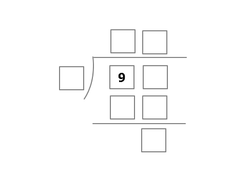Almost completely empty
 The above shows a condensed form of long division between 2 integers, with the last box at the bottom representing the remainder of the quotient. Each box represents a
distinct
single digit non-negative integer.
The above shows a condensed form of long division between 2 integers, with the last box at the bottom representing the remainder of the quotient. Each box represents a
distinct
single digit non-negative integer.
What are the two integers that are not used?
Submit your answer as the product of these two integers.
The answer is 15.
This section requires Javascript.
You are seeing this because something didn't load right. We suggest you, (a) try
refreshing the page, (b) enabling javascript if it is disabled on your browser and,
finally, (c)
loading the
non-javascript version of this page
. We're sorry about the hassle.
1 solution
I did the same thing. I typed the product of 7 and 0 = 0. Isn't that what we had to do?
Correct!!!!! ThankYou
Yes Same Way and nice writing!
I don't understand the form. If we divide 90 to 7, should we have two divide steps, which create two digits (1 and 2) in the result?
Log in to reply
we are actually trying to make one step here. as the question says "condensed form".
Log in to reply
From what I understand about the "condensed", you do not write the result of multiple (e.g 7*1 = 7), but still need to show the result of subtraction (e.g 9-7=2). Otherwise, where do you get the 2 (in the result 12) to multiple with 7?
Log in to reply
@Tran Hieu – i think that is true for long division, but as we are given only small space and the leading digit of the dividend is 9, we have to deduce what "condensed form" means.
I took the divisor as 2, dividend as 91, quotient is 43, number subtracted by is 86, remainder is 5. So, the answer would be 7x0 = 0. Which still works. except it isn't in the condensed form, I guess.
Not necessary there should be 8 below 9
I figured it out to be 91/2 which is 43r5 and 43*2=86 so the divisor is 86. So we use 1, 2, 3, 4, 5, 6, 8, and 9. We don"t use 7 and 0 so I put in 7 * 0 = 0 as the answer and it said I was wrong.
Log in to reply
it cannot be 91/2 with 43r5 because the remainder is larger than the divisor
I filled the blanks as 91-2x43=5....hence the remaining integers are 7 and 0...so product is zero...i think tha question has more than one solution
Log in to reply
All the digits are distinct. You used the digit 9 twice.
I divided 97 by 2 and ended up with 3 and 5 , so 15. Got credit. I think this problem has flaws. It's just not clear.
Since all digits are distinct, the box below 9 must be equal to 8.
Now, we note that the reminder cant be equal to 0, this is because there would be same number below the nine. we eliminate 1. if it is two, it can not be <90. so eliminated.
If it is 3 the result is 3 0 something so eliminated.
If it is four, the below would be 8 8 , hence eliminated.
If it is five, it cant be less than 90 ,hence eliminated.
At 6 it cant be<90 hence eliminated.
At 8 the below will be 8 8 .
At 9 it can't be less than 90. we check 7 as it is the only one alive.
Yes! it works. we see the required numbers are 3 and 5. the product is 1 5 .